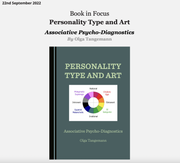Great news for anyone interested in personality typology: a remarkable article outlining the contents of the new book has appeared on the Book in Focus page of Cambridge Scholars Publishing. For the first time the book became available to readers in English in April of this year. If you haven’t heard anything about it yet, now is the time to get acquainted with its description and use the opportunity to purchase the book with a 25 percent discount on the publisher’s website.
I will be grateful to anyone who will kindly share this link with their friends so that as many people as possible know about the existence of a new book and have the opportunity to purchase it. The book is the best gift!
I have been researching and studying the theory of 16 personality types for over 20 years. During these studies, I developed my own concept of a link between art preferences and the psychological make-up of people. This was the beginning of the idea of associative socionics, a model of the human psyche in the form of a butterfly and a new method for understanding personality types.
Similar books by other authors describe artists and their work in relation to their personality types, but lack a systematic approach to interpreting art separately from the psychological type of artist producing it. This lack of a more general concept and method prevents people from identifying personality types based on their musical and artistic preferences.
The reason for this is partly understandable. After all, some may claim that paintings and music do not possess a psyche, and hence have no personality. According to the new concept presented in this book, works of art bear the imprint of psychic energy, which can be understood and explained using the same basic criteria of the typology of 16 personality types. To understand people’s preferences in art, one should not invent new dichotomies or describe functions differently to complicate the theory and practice of typology any further.
The uniqueness of this book is that the reader will benefit from distinguishing between the types of psychic energy present in works of art and gain insight about the stable psycho-physiological characteristics of the personality, without asking questions of a personal nature. This is the difference between this book and other books with similar titles.
Great news for anyone interested in personality typology: a remarkable article outlining the contents of the new book has appeared on the Book in Focus page of Cambridge Scholars Publishing. For the first time the book became available to readers in English in April of this year. If you haven’t heard anything about it yet, now is the time to get acquainted with its description and use the opportunity to purchase the book with a 25 percent discount on the publisher’s website.
I will be grateful to anyone who will kindly share this link with their friends so that as many people as possible know about the existence of a new book and have the opportunity to purchase it. The book is the best gift!
The author explains how to understand and interpret art, as well as people’s artistic preferences, using the criteria of typology. A beginner in socionics will also find in the book a description of the basic concepts of the founder of socionics, Aušra Augustinavičiūtė. Numerous illustrations by various artists and lists of favourite genres of music for all 16 types, as well as their profiles, are provided as learning materials. This makes the reading of the book both enjoyable and rewarding.
Olga Tangemann studied at the Faculty of Foreign Languages at the Khabarovsk Pedagogical Institute, Russia, and the Faculty of Foreign Languages of the Pedagogical University of Saint Petersburg. She holds a Master’s degree in Forensic Psychology from the University of Leicester, UK, and worked as an Assistant Therapist at the Royal Free Neurological Rehabilitation Centre (NRC) at Edgware Community Hospital in London. She is the author of several articles on socionics and head of the school of associative socionics.




